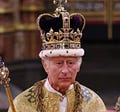King Charles. And Recognizing Me.
“I have already lost touch with a couple of people I used to be.”
—Joan Didion
On July 29, 1981, I woke up all four of my stepchildren in the middle of the night. I had prepared a traditional English breakfast, and we sat in our pajamas watching the wedding of Prince Charles and Princess Diana. Throughout the ceremony I kept reminding them that their father, Michael (aka H1—my first husband), was a British subject, and that they had dual citizenship and this was their history, their heritage. One of them recently told me that this is a vivid image in her mind; I would think part of her sense of self, because of the way I touted it at the time. Their father wouldn’t have woken them up to watch unless I had pushed it. I thought it was a great morning, and I loved watching the pomp and circumstance and the tradition and the lovely bride, and imagining the surely perfect future they all would have, and which, thanks to their British DNA, my stepkids would surely have as well.
Fast forward forty-two years. I have zero interest in King Charles’ coronation. I think Catherine has a mean resting face, and when I caught a video on social media showing some minister in robes putting that ridiculous crown on King Charles’ head while saying, “I crown you king of kings,” and other phrases suggesting that whatever he says and does now will be right for all people, I quickly scrolled to the next video in my feed.
A recent article in The New Yorker observed that, when KC walks into a room, he’s usually the only one there who hasn’t earned any of what he calls his own. He inherited everything he is and has and it doesn’t sit well in his soul—nor does the heavy crown upon his head. He still sleeps with a Teddy bear. He has a notorious temper. His most recent concern had to do with the lack of organ players entering music school; this bothered him so much that he called Andrew Lloyd Webber to the castle to discuss what could be done about it. But forgive me. I’m not being fair. The new king champions many worthy causes (none of which come to mind at the moment), but he never had a prayer of being anything other than out of touch and ridiculous given who he is and how he was raised.
But back to me.
How I have changed in the years since that early morning in 1981. I do not recognize that twenty-eight-year-old, newly married stepmom of four who was trying to give the kids a foundation of who they were and whence they came. Today, I would want to talk to them about how a royal history of poverty-stricken colonies that have been economically raped for the benefit of England’s ruling class is not something to celebrate. It’s something to try to alleviate. Celebrate, alleviate—anyone else think it’s interesting that they rhyme? Which of them you lean toward depends on your point of view.
So, I recognize how I’ve changed over the years. I like the me that I am now. I would like to be less strident in my point of view, more able to seek to understand rather than be understood. I guess it can start with Charles, who spent sixty years waiting for this day and looked so desolate through the entire proceedings. Is anyone home behind that face? But I will wish him well, and try to start becoming the version of myself who will be able to look back ten years from now and not recognize the person I am today—because I’ll be even better.



